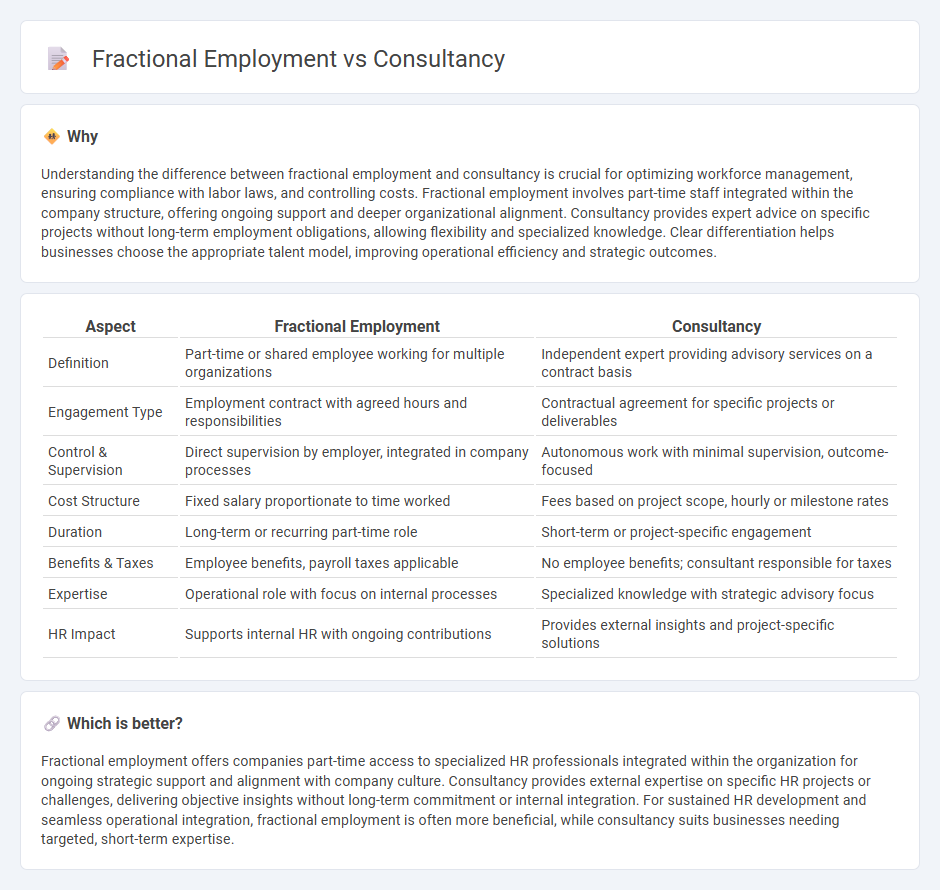
Fractional employment offers businesses flexible access to skilled professionals who work part-time or on specific projects, optimizing workforce costs while maintaining specialized expertise. Consultancy provides expert advice and strategic guidance without integration into daily operations, focusing on problem-solving and process improvements. Explore the differences and benefits of fractional employment versus consultancy to enhance your organization's talent strategy.
Why it is important
Understanding the difference between fractional employment and consultancy is crucial for optimizing workforce management, ensuring compliance with labor laws, and controlling costs. Fractional employment involves part-time staff integrated within the company structure, offering ongoing support and deeper organizational alignment. Consultancy provides expert advice on specific projects without long-term employment obligations, allowing flexibility and specialized knowledge. Clear differentiation helps businesses choose the appropriate talent model, improving operational efficiency and strategic outcomes.
Comparison Table
| Aspect | Fractional Employment | Consultancy |
|---|---|---|
| Definition | Part-time or shared employee working for multiple organizations | Independent expert providing advisory services on a contract basis |
| Engagement Type | Employment contract with agreed hours and responsibilities | Contractual agreement for specific projects or deliverables |
| Control & Supervision | Direct supervision by employer, integrated in company processes | Autonomous work with minimal supervision, outcome-focused |
| Cost Structure | Fixed salary proportionate to time worked | Fees based on project scope, hourly or milestone rates |
| Duration | Long-term or recurring part-time role | Short-term or project-specific engagement |
| Benefits & Taxes | Employee benefits, payroll taxes applicable | No employee benefits; consultant responsible for taxes |
| Expertise | Operational role with focus on internal processes | Specialized knowledge with strategic advisory focus |
| HR Impact | Supports internal HR with ongoing contributions | Provides external insights and project-specific solutions |
Which is better?
Fractional employment offers companies part-time access to specialized HR professionals integrated within the organization for ongoing strategic support and alignment with company culture. Consultancy provides external expertise on specific HR projects or challenges, delivering objective insights without long-term commitment or internal integration. For sustained HR development and seamless operational integration, fractional employment is often more beneficial, while consultancy suits businesses needing targeted, short-term expertise.
Connection
Fractional employment and consultancy are connected through their flexible workforce solutions that allow organizations to access specialized skills without committing to full-time hires. Fractional employees often work part-time across multiple companies, providing strategic expertise similar to consultants who offer tailored advice and project-based support. Both approaches optimize organizational agility, reduce overhead costs, and enhance access to industry-specific knowledge.
Key Terms
Outsourcing
Consultancy in outsourcing involves hiring external experts for specialized advice or project-based work, providing flexibility and access to high-level skills without long-term commitment. Fractional employment offers part-time, ongoing engagement with professionals embedded within a company, delivering consistent expertise and integration into internal teams. Explore the key differences to determine which outsourcing approach best aligns with your business goals.
Interim Management
Interim management provides expert leadership during transitional periods, offering flexibility and specialized skills without long-term employment commitments. Unlike consultancy, which typically advises and designs strategies, interim managers actively lead and implement changes within the organization. Discover how interim management can drive your business transformation efficiently.
Talent Acquisition
Talent acquisition strategies diverge significantly between consultancy and fractional employment models, with consultancies offering flexible, expertise-driven project support while fractional employment provides integrated, part-time roles for consistent talent engagement. Consultancies excel in delivering specialized talent for short-term, high-impact initiatives, whereas fractional employment ensures ongoing access to skilled professionals embedded within the company culture. Explore the advantages and applications of each approach to optimize your talent acquisition strategy.
Source and External Links
What is consulting? | Consultancy.in - Consulting or consultancy is the provision of independent, specialist advice and/or implementation support to organizations across industries, focusing mainly on business strategy, management, operations, and technology, with consultants offering expert guidance in exchange for a fee.
What is consulting? - Consultancy.org - Consulting firms provide an independent perspective and specialist expertise on business challenges, often helping clients with knowledge gaps or capacity issues to manage change, offering cost-effective solutions compared to hiring internal experts.
34 Types of Consulting Services to Offer Clients - Paperbell - Consultants specialize in specific business areas such as strategy, technology, or operations, advising clients to solve challenges by proposing actionable solutions and plans, distinct from coaching or education.
 dowidth.com
dowidth.com